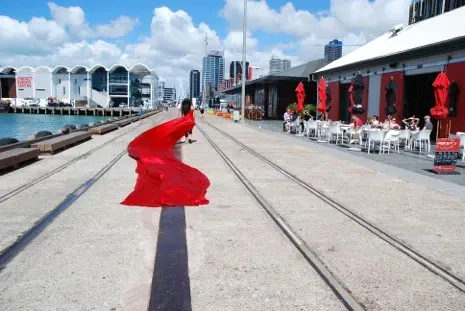Performance Ethics Episode 5: Indigenous and Traditional Knowledge

Recognising that the performing arts in Aotearoa New Zealand are structured and understood through dominantly western paradigms in this podcast we look at what ways matauranga Maori, Maori knowledge and ways of understanding the world, can and should be recognised and reflected.
Recognising that the performing arts in Aotearoa New Zealand are structured and understood through dominantly western paradigms in this podcast we look at what ways matauranga Maori, Maori knowledge and ways of understanding the world, can and should be recognised and reflected. In addition we explore the complexities of working with multiple cultural paradigms and histories and the risk of furthering cultural imperialism through this.
Who is speaking and when:
0:00:0 Introduction (Melissa Laing) | 0:01:50 Louise Tu’u
0:0207 Murray Edmond | 0:03:00 Rose Martin
0:06:32 Val Smith | 0:08:05 Tru Paraha
0:08:29 Sean Curham | 0:09:49 Mark Jackson
0:13:10 Alys Longley | 0:14:11 Moana Nepia
0:14:47 Alexa Wilson | 0:16:04 Murray Edmond
0:16:59 Alison East | 0:17:37 Sally Morgan
0:21:21 Kalisolaite ‘Uhila | 0:21:58 Moana Nepia
0:22:44 Kalisolaite ‘Uhila | 0:23:18 Moana Nepia
0:23:51 Tru Paraha | 0:24:20 Val Smith
0:26:50 Sally Barnett | 0:27:24 Moana Nepia
0:28:11 Sally Barnett | 0:29:44 Moana Nepia
0:31:58 Kalisolaite ‘Uhila | 0:33:23 Carol Brown
0:39:33 Tru Paraha | 0:40:47 Louise Tu’u
0:41:20 Craig Cooper | 0:43:31 Tru Paraha
0:45:04 Stephen Bain | 0:46:53 Louise Tu’u
0:49:35 Stephen Bain | 0:50:34 Craig Cooper
0:51:55 Tru Paraha | 0:58:03 Craig Cooper
0:58:13 Tru Paraha | 1:02:11 Stephen Bain
1:03:16 Moana Nepia | 1:06:00 Tru Paraha
1:06:31 Moana Nepia | 1:07:07 Sally Barnett
1:09:50 Moana Nepia | 1:10:40 Tru Paraha
1:11:13 Mark Jackson | 1:11:58 End
Glossary of Maori terms used.
All of the translations have been taken from Te Aka Maori-English, English-Maori Dictionary www.maoridictionary.co.nz and the words link to the extended definitions. Maori are the tangata whenua, the indigenous people of Aotearoa, New Zealand.
Kaupapa Maori – Maori ideology – a philosophical doctrine, incorporating the knowledge, skills, attitudes and values of Maori society.
Matauranga Maori - education, knowledge, wisdom, understanding, skill.
Tapu - be sacred, prohibited, restricted, set apart, forbidden.
Noa - be free from the extensions of tapu, ordinary, unrestricted.
Mana – prestige, authority, control, power, influence, status, spiritual power, charisma
Mana Whenua – Territorial rights, power from the land – power associated with possession and occupation of tribal land.
Tangata Whenua - local people, hosts, indigenous people of the land – people born of the whenua.
Iwi - extended kinship group, tribe, nation, people, nationality, race.
Karanga - formal call, ceremonial call – a ceremonial call of welcome to visitors onto a marae, or equivalent venue, at the start of a powhiri.
Powhiri - invitation, rituals of encounter, welcome ceremony on a marae, welcome.
Wero - challenge
Kapa Haka - concert party, haka group, Maori cultural group, M?ori performing group.
Tikanga - correct procedure, custom, habit, lore, method, manner, rule, way, code, meaning, plan, practice, convention.
Taonga - treasure, anything prized – applied to anything considered to be of value.
Taonga Puoro - musical instrument.
Toi Moko – art of tattooing
Moko - Maori tattooing designs on the face or body.
Taiaha - a long weapon of hard wood with one end carved and often decorated with dogs’ hair.
Hikoi - to step, stride, march, walk
Ngati Whatua - tribal group of the area from Kaipara to Tamaki-makau-rau (the Auckland Isthmus)
Te Matatini – the national kapa haka competition http://www.tematatini.co.nz/
- Episode 5: Ethics and Indigenous and Traditional Knowledges (first released 24 April 2014)
- Available at University Without Conditions
Courtesy of University Without Conditions